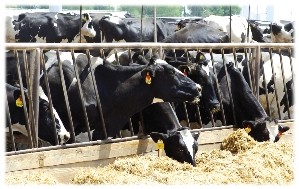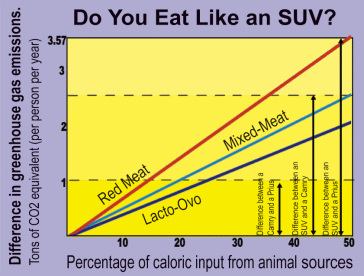By USA News Group (Originally in English)
不吃肉、騎腳踏車、少消費,就可協助遏止全球暖化
~聯合國「跨政府氣候變遷小組」主席帕卓里博士於2008年元月15日講於巴黎
Don’t eat meat, ride a bike, and be a frugal shopper -- that’s how you can help brake global warming. – Dr. Rajendra K. Pachauri, Chairman, Intergovernmental Panel on Climate Change (IPCC), Paris, January 15, 2008
有許多眾所周知的方法可以減少二氧化碳的排放,例如:減少石化燃料的使用、使用太陽能或風力等再生能源、開省油的車子或替代能源車、使用省電的電子產品,並切實做到減量、重複使用和回收等。然而,遏止全球暖化最有效的方法就是吃素。
There are numerous ways that are commonly known to reduce carbon dioxide emissions: reducing fossil fuel usage; engaging in renewable energies such as solar or wind power; reducing, reusing and recycling everyday items; driving a fuel-efficient or alternative energy car; using energy-saving electronics, and others. Yet the most powerful way to stop global warming is to adopt a vegetarian diet!
在聯合國「跨政府氣候變遷小組」(IPCC)於元月15日所召開的記者會上,主席帕卓里博士(Dr. Pachauri)提出警告說:「如果人類不即刻採取行動的話,氣候變遷將導致嚴重的後果。」他也明確指出,遏止氣候變遷的方法就是不吃肉,並改成更環保的生活方式。
In a press conference on January 15, held by the Intergovernmental Panel on Climate Change (IPCC), the head of the IPCC, Dr. Pachuari warned that if the human race doesn’t act now, “climate change will have serious impacts.” He also clearly stated that the way to halt climate change is to stop eating meat, and make a change to a greener lifestyle.
聯合國於2006年發表的一份關於牲畜與環境的報告指出:「無論是從地方或全球的角度而言,畜牧業都是造成嚴重環境危機前三名最主要的元凶之一。」幾乎有20%的二氧化碳排放來自於畜牧業,這比全世界所有交通工具的總排放量還多!
The United Nations’ report on livestock and the environment published in 2006 revealed that, “The livestock sector emerges as one of the top two or three most significant contributors to the most serious environmental crisis, at every scale from local to global.” Almost a fifth (20 percent) of carbon emissions come from livestock - that’s more emissions than from all of the world’s transportation combined!
 |
工廠化養殖業是破壞環境和排放溫室氣體的主凶,這項事實令許多人跌破眼鏡。
Industrialized animal-based agriculture is “astonishingly” the main cause of environmental destruction and greenhouse gas emissions.
飼養動物作為食物,是產生二氧化碳的最大根源之一,同時也是排放甲烷和一氧化二氮的最大來源。全 球9%的二氧化碳、65%的一氧化二氮及37%的甲烷排放,都是肇因於畜牧業所從事的人為相關活動,其中甲烷(溫室效應為二氧化碳的20倍)和一氧化二氮 (溫室效應為二氧化碳的296倍)兩者都是比二氧化碳更具破壞力的溫室氣體。畜牧業也產生64%的人為氨氣,這種氣體對酸雨的形成難辭其咎。
Raising animals for food is one of the largest sources of carbon dioxide and the single largest source of both methane and nitrous oxide emissions. The livestock sector accounts for 9 percent of carbon dioxide, 65 percent of nitrous oxide and 37 percent of methane produced from human-related activities. Both methane (20 times) and nitrous oxide (296 times) are considerably more potent greenhouse gases than carbon dioxide. Livestock also generates 64 percent of human-related ammonia, which contributes to acid rain.
畜牧業也是破壞、污染土地與水源的最大元凶,目前牲畜養殖就佔用了地球30%的土地,而且有更多的土地與水資源被用於種植牲畜的飼料。負責為聯合國糧農組織撰寫報告書的資深作家史坦菲爾先生(Mr. Steinfeld),在「牲畜長遠的陰影:環境問題與選擇」(Livestock's Long Shadow–Environmental Issues and Options)一文指出:「畜牧業是濫伐森林的元凶…亞馬遜原有的森林中有70%都變成了牧場。」此外,畜牧業更是破壞土地的罪魁禍首,約有20%的牧場用地因過度放牧、密集飼養牲畜與遭受侵蝕,地力被破壞殆盡。畜牧業也消耗並污染了大量的水資源,單是在美國,每年就有數兆加侖的灌溉用水,用來種植牲畜的飼料,約佔美國淡水資源的85%。而牲畜產生的大量排泄物,也令生態系統難以負荷。
It is also a major source of land and water damage and pollution. Livestock currently use 30 percent of the Earth’s land surface, and even more land and water is used to grow the feed for livestock. According to Mr. Steinfeld, the senior author of the Food and Agriculture Organization report, Livestock’s Long Shadow–Environmental Issues and Options, livestock is the “major driver of deforestation … some 70 percent of former forests in the Amazon have been turned over to grazing.” In addition, animal-based agriculture causes land degradation. About 20 percent of pastures are degraded through overgrazing, compaction and erosion. It is also responsible for vast water consumption and pollution. In the USA alone, trillions of gallons of irrigation water is used to grow crops to feed animals annually. This is about 85 percent of the USA’s fresh water resources. Animals also generate excessive amounts of biological waste for the ecosystem to take.
| 一公斤食物 | 耗水量 (公升) |
| 牛肉 | 1,000,000 |
| 雞肉 | 3,500 |
| 黃豆 | 2,000 |
| 米 | 1,912 |
| 小麥 | 900 |
| 馬鈴薯 | 500 |
Water consumption in generating one kilo of food in US
animal-based agriculture
1 kg of meat | Water (liter) |
Beef | 1,000,000 |
Chicken | 3,500 |
Soybean | 2,000 |
Rice | 1,912 |
Wheat | 900 |
Potato | 500 |
除了破壞環境和生態系統之外,不難估算出畜牧業是最浪費能源的產業; 人們耗費了龐大的能源,只為了將牲畜變成餐桌上的肉食。而且生產一公斤的肉,也會排放36.4公斤的二氧化碳。根據計算,生產一卡熱量的黃豆蛋白質僅需兩 卡的石化能源,玉米或小麥則需要三卡;然而生產一卡熱量的牛肉蛋白質,卻需消耗54卡的石油能源!
Besides the damages to the environment and ecosystem, it is not hard to calculate that animal-based agriculture is the least energy-efficient practice; it takes enormous energy to convert livestock to meat on people’s dining table. Producing one kilogram of meat causes carbon dioxide emissions equivalent to 36.4 kilos. It is calculated that to produce one calorie of protein takes only two calories of fossil fuel for soybean, three calories for corn and wheat, but it takes 54 calories of petroleum energy for beef protein!
由此顯示出,生產一份牛肉漢堡所消耗的石化能源,是生產一份黃豆漢堡的27倍!
It means it takes 27 times as much fossil fuel energy to make a hamburger as it takes to make a soy burger!
綜觀能源成本、耗水量、土地使用、環境污染、生態威脅等各方面,我們毫不意外地發現,生產一份肉食餐飲所消耗的資源,足以提供至少十五份的蔬食餐飲。
n combination of energy cost, water consumption, land usage, environmental pollution, ecosystem disruption, it is not surprising to learn that one meat-based diet could feed 15 plant-based diets or more.
去年,芝加哥大學地球物理科學系的研究員吉登‧埃胥爾(Gidon Eshel)和潘蜜拉‧瑪汀(Pamela Martin)的研究,也顯示了食物生產和環境問題之間的關聯。他們將生產紅肉、魚肉、禽肉、牛奶和蛋類所產生的溫室氣體加以量化,並與生產純素糧食所產 生的溫室氣體量對照,結果發現,從標準的美式飲食轉換成蔬食,每人每年可以減少1.5公噸的溫室氣體排放。相較之下,從豐田Camry轎車轉換成豐田Prius油電混合車,則可減少約1公噸的二氧化碳排放量。
Last year, researchers from the Department of Geophysical Sciences at the University of Chicago, Gidon Eshel and Pamela Martin, also disclosed the connections between food production and environmental problems. They quantified the greenhouse gas consequences of red meat, fish, poultry, milk and eggs, and compared those numbers to a vegan diet. They found that switching from the standard American diet to a plant-based diet could result in preventing an extra ton and a half of greenhouse emissions per person per year. By contrast, switching from a standard sedan like a Toyota Camry to a hybrid Toyota Prius saves about one ton of CO2 emissions.
| |
 |
|  |
抉擇就在你的廚房裡:儘管人們無視於畜牧業罔顧道德的殘酷行為,遏止氣候變遷的緊迫程度與作法已昭然若揭,這不只是素食者或環保人士的說法而已,目 前聯合國「跨政府氣候變遷小組」的主席帕卓里博士已告知世人,吃肉對我們的星球有害,我們應該停止吃肉以扭轉情勢;然而這有賴於人們作出正確的抉擇。我們 每個人都有責任使地球變得更涼爽、更潔淨、更健康,方法很簡單,只要從自家廚房開始做起,也就是選擇吃素,並協助扭轉氣候變遷的頹勢。
The choice is right in your kitchen: Even if one chooses to close their eyes to the ethical cruelty in animal-based agriculture, the urgency of stopping climate change and how to do it is clear. And it’s not just the vegetarians or environmentalists who are saying it; now the head of an international body, Dr. Pachauri, has announced to the world that the effects of meat-eating are detrimental to our planet and that we should stop eating meat in order to turn things around. Yet it comes down to people’s choice. We’re all responsible for a cooler, cleaner and healthier Earth. So simply start in your kitchen: choose a vegetarian diet and help reverse climate change.
Reference:
1.http://www.huffingtonpost.com/kathy-freston/vegetarian-is-the-new-pri_b_39014.html 2.http://www.goveg.com/environment-globalwarming.asp 3.http://www.satyamag.com/feb07/eshel.html
Dr. Will Turtle: The world peace diet chapter 11 and the references used therein
4.http://afp.google.com/article/ALeqM5iIVBkZpOUA9Hz3Xc2u-61mDlrw0Q
5.http://www.un.org/apps/news/story.asp?NewsID=20772&Cr=global&Cr1=warming 6.http://www.news.cornell.edu/releases/Aug97/livestock.hrs.html
7.衛爾.託特博士(Dr. Will Turtle):世界和平的飲食第11章及參考引據資料
http://classic.godsdirectcontact.org.tw/eng/news/194/index.htm
沒有留言:
張貼留言